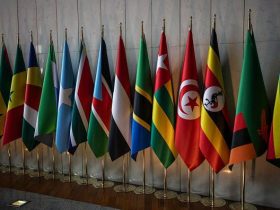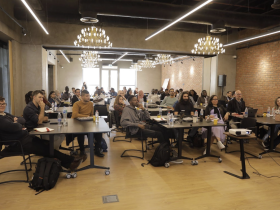There is much to say about the rigorous scientific debate around climate change. This contribution is more humble, however, and comes down to this point: South Africans will not, and probably should not, care about climate change while their stomachs growl in hunger and their bank accounts are empty more often than not. And certainly not if the lights are off.
The capacity of a person to care about matters other than their immediate survival or that of their family is very limited, and rightly so. With more than 12 million South Africans unemployed and more caught in what at times seems like an inescapable cycle of poverty, it should be evident that climate change is not high on many people’s priority lists. It is almost exclusively a topic with which global experts and elite members of the local political class engage.
Of course, we should want environmental conservation to be a higher priority for most South Africans. But advocacy, virtue-signalling, and guilt-tripping will not achieve that. The only way to achieve this noble goal is to finally solve the poverty crisis, which is easier done than said.
Getting government out of the way of economic progress – in other words, deregulation and liberalisation – would, and does, significantly reduce poverty. It is more difficult to explain why this is than to simply show it, hence easier done than said. The people of the Asian Tiger states went from poor to rich in a generation largely due to market liberalisations. The proof was in the pudding for them.
To attempt a brief explanation: By reducing red-tape and regulation, government makes it significantly easier for entrepreneurs to start businesses and run those businesses on the terms and conditions they deem fit, which will almost all be economic and commercial considerations, not political considerations that are advanced by regulation. This incentivises growth, mainly out of self-interest, but which invariably favours third parties.
Government knows this, which is why in every SONA for the past few years there has been a renewed commitment to reducing red-tape. White papers very often recognise that more government intervention in the economy amounts to a drag, not a boost, but that other political considerations must take precedence over economic growth and freedom.
Now to show it: Every global index of economic freedom, the two most prominent of which are the conservative Heritage Foundation’s Index of Economic Freedom and the liberal Fraser Institute’s Economic Freedom of the World report, when compared to other indices like the Human Development Index, shows that the free enterprise system correlates positively with socio-economic prosperity, virtually without exception.
The most important feature, in my view, has been that the poorest 10% in the free enterprise states of the world have incomes between eight and ten times higher than the poorest 10% in the states with more economically interventionist governments.
The free enterprise system, depending on your perspective, of course, has some drawbacks. It means that worthy social and political goals cannot simply be coercively compelled upon non-consenting persons. A firm might pay its employees a wage deemed inadequate by experts and politicians, but free enterprise means that that firm must be left alone. Similarly, private power producers may erect coal-fired power plants and sell the output to users without having to get approval. Even a church getting to ordain transgender pastors without having to worry about whether the political class approves is a manifestation of free enterprise.
Naturally, no economic or social system anywhere in the world is entirely liberal, but the evidence leaves it beyond dispute that the closer a society leans towards free enterprise, the more prosperous its economy is. And those societies that in fact do lean closer to free enterprise, are invariably the societies that have the bandwidth to seriously consider green energy.
Climate change advocacy and the push toward green energy came about and are dominant in the West for good reason. The West is economically prosperous, largely due to its preference for free enterprise and its history of utilising sustainable power sources for a century or more. What passes for poverty in the West would comfortably qualify as middle class in South Africa and likely as middle to upper class in other developing states. Simply put, the West has the luxury to dedicate its focus on climate change, because the lights are on and the economy is powered. And this is excellent and admirable.
South Africa’s goal should be to put itself in this same position to take climate change and green energy seriously as soon as possible. But the way to get there, which is necessarily upsetting to the green establishment, is that South Africa would probably need to exploit the full potential of its coal and uranium reserves.
Once the electricity crisis has ended and a sustainable flow of power has been ensured – and, with any luck, other market reforms away from central planning – could the economy begin to recover, with additional economic infrastructure being built upon a solid foundation. Only once that has happened, can we honestly begin to consider how to phase out the sustainable sources of power, coal and nuclear, in favour of renewable ones. We are putting the cart before the horse by trying – as we sit in darkness – to figure out how to power our economy on the strength of sunlight and wind alone.
This is not to say the South African government must spend inordinate amounts of taxpayer money on expanding, upgrading, or building additional coal and nuclear power plants. In fact, such a situation must be resisted by all reasonable means. What must happen, instead, is that the restrictions on sources of power must be lifted, and the government must step out of the way while the private sector secures the energy future of the economy.
As a start to this process, section 8(1) of the Electricity Regulation Act should be amended to allow private power producers to generate, transmit, distribute, and trade electricity without requiring a licence. A discussion can be had about what government regulation might be necessary to make this happen, but the first port of call must be radical deregulation while South Africa sits on the brink of a complete blackout.
South Africans should be very concerned about saving the planet. But we are kicking the arrival of such a public sentiment into touch by trying to leapfrog over the necessary preconditions that enable it.
It was only after attaining prosperity in the West that people in the West started caring about the environment. That will not be any different here. The sooner South Africa becomes economically prosperous – something that is attainable in a generation or less with liberalisation – the sooner public sentiment will shift in favour of renewables. And economic prosperity requires a solid energy foundation which South Africa presently lacks, despite its generous coal and uranium reserves.
























Leave a Reply